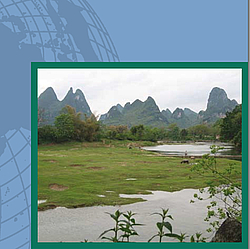
Policy Reinforcement for Environmentally Sound and Socially Responsible Development in China (PRODEV)
FOSTERING A GREEN ECONOMY IN CHINA
An environmentally sound and socially responsible economic development is a declared aim of most political leaders around the globe. Despite this stated aim, policy frameworks and an absence of integrated decision-making processes often pose significant barriers. Accordingly, it is important to support governments to develop effective policy frameworks and decision making processes with respect to Sustainable Consumption and Production (SCP).
Green Economy in Guiyang
The implementation of a circular economy (CE) brings benefits including efficient material use and reduced pressure on the environment. Recycling and reuse of wastes as production resources can further enhance environmental performance while at the same time reduce production cost. The city of Guiyang in the south of China implemented a circular economy development plan. The plan set sustainability goals and developed corresponding policy tools with a focus on the aluminium, coal- and phosphorus based industries, in addition to herbal medicine, tourism and organic agriculture. However, to effectively implement the local circular economy plan in a manner that local people can profit from its benefits requires a significant shift in government policymaking practice.
The main barriers were connected to the limited experience and knowledge among local authorities and citizens on taking the circular economy concept from theory to practice. Improvements were also needed to tackle deficiencies in environmental policy, planning guidelines and coordination efforts among authorities and other groups in society. The “Policy reinforcement for environmentally sound and socially responsible development in China” (PRODEV) project aims to address these challenges by improving the local policy framework and promoting integrated decision-making processes in Guiyang.
Capacity building for local authorities
The main target audience for the project are local government policy-makers in Guiyang city. Chinese government trainers, mayors from diverse Chinese cities and other Asian developing countries also benefited from the project by learning from the experiences in Guiyang. The project strategy was to merge European and Chinese experience respecting policy supporting a circular economy. Best practice examples from Europe were analyzed to identify the most relevant and suitable solutions within the Chinese context.
In this way Guiyang policy makers benefited from new knowledge and built linkages with European and Chinese decision makers. A detailed policy framework study on best practices was drafted to highlight policy gaps and opportunities for policy modification in Guiyang. Moreover, soft skills were developed through capacity building training programs that emphasised the importance of communicating proposed changes with the public.
Background
The project “Policy reinforcement for environmentally sound and socially responsible development in China” was supported by the Commission of European Communities within the Asia Pro Eco Programme. It was coordinated by the United Nations Environmental Programme (UNEP) and carried out by the CSCP and the Municipal Government of Guiyang.

For more information please contact:
Michael Kuhndt • Director of the CSCP
+49 (202) 459 58 20 • michael.kuhndt@scp-centre.org
